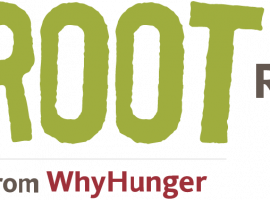In honor of National Women’s History Month, for this month’s reading list, we’re highlighting works by women working in and/or leading movements in the food justice and sustainability space.
 What does a woman who wants to work the land need to do to follow her dream? Audrey Levatino shares insights from running her own farm and offers advice on how to get started. Filled with stories from other women farmers as well, this book is a valuable addition to an individual new to farming regardless of if they own a tiny urban plot or multiple acres.
What does a woman who wants to work the land need to do to follow her dream? Audrey Levatino shares insights from running her own farm and offers advice on how to get started. Filled with stories from other women farmers as well, this book is a valuable addition to an individual new to farming regardless of if they own a tiny urban plot or multiple acres.
 Based on her extensive ethnographic fieldwork, the Rev. Dr. Ayres provides a theological foundation to food practices of diverse faith communities. Despite the brokenness of America’s food system, communities still manage to form connections and find meaning in nourishment at their tables. This is a critical examination of religious practices of food justices, and a challenge to faith communities to support local farmers, grow their own food, and advocate for fair food policies.
Based on her extensive ethnographic fieldwork, the Rev. Dr. Ayres provides a theological foundation to food practices of diverse faith communities. Despite the brokenness of America’s food system, communities still manage to form connections and find meaning in nourishment at their tables. This is a critical examination of religious practices of food justices, and a challenge to faith communities to support local farmers, grow their own food, and advocate for fair food policies.Outside the Magic Square: A handbook for food security by Lolo Houbein
 Considers the issue of food security and offers solutions at the street, neighborhood, and global level on topics ranging from climate security and sustainability, to the very specific micro- and macronutrients that comprise our foods and how to make the best use of what and how we eat in today’s world.
Considers the issue of food security and offers solutions at the street, neighborhood, and global level on topics ranging from climate security and sustainability, to the very specific micro- and macronutrients that comprise our foods and how to make the best use of what and how we eat in today’s world.
Staying Alive: Women, Ecology, and Development by Vandana Shiva
 Award-winning Indian environmentalist Vandana Shiva proves how ecological destruction and the marginalization of women are both connected and preventable, both economically and scientifically. She describes how Indian women experience such processes and the ways in which they navigate to prevent further damage to nature and instead initiate its regeneration through various means.
Award-winning Indian environmentalist Vandana Shiva proves how ecological destruction and the marginalization of women are both connected and preventable, both economically and scientifically. She describes how Indian women experience such processes and the ways in which they navigate to prevent further damage to nature and instead initiate its regeneration through various means.
 At a time when modern agriculture was in its early stages, women farmers’ lives gradually began to transform. Jenny Devine traces the historical underpinnings of agrarian feminist movements after 1945 for Midwestern female farmers. By highlighting particular periods in time, Devine sheds light on how these women had to often to reassess and reevaluate their roles within agriculture and farming while simultaneously maintaining certain traditions and improving in others in their way of life and living.
At a time when modern agriculture was in its early stages, women farmers’ lives gradually began to transform. Jenny Devine traces the historical underpinnings of agrarian feminist movements after 1945 for Midwestern female farmers. By highlighting particular periods in time, Devine sheds light on how these women had to often to reassess and reevaluate their roles within agriculture and farming while simultaneously maintaining certain traditions and improving in others in their way of life and living.




